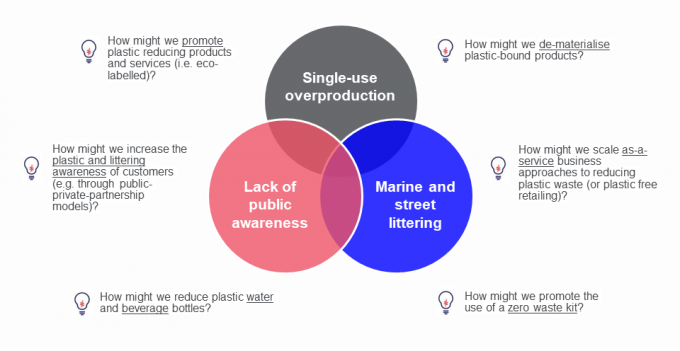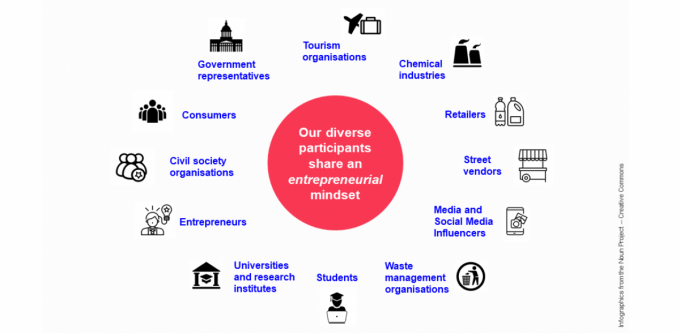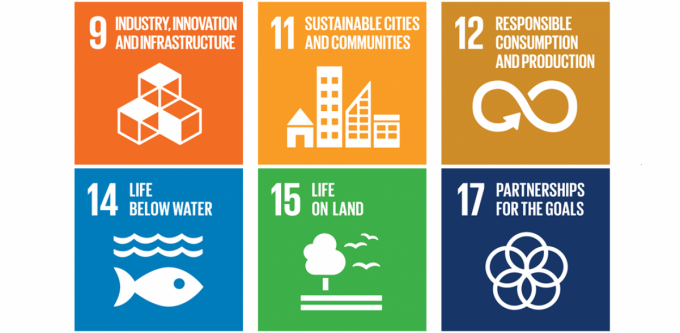Developing business solutions to reduce plastic waste in Thailand in the 8th lab of tomorrow process
How might we reduce, reuse or substitute single-use plastic in order to decrease plastic waste ending up in rivers and oceans in Thailand? This is the challenge of the upcoming lab of tomorrow (lot) process. During a four-day innovation workshop, taking place from September 10 to 13 in Bangkok, businesses and experts from Europe and Thailand will develop viable new business models that address the plastic waste problem. Join the 8th lot process by applying online until 15 July. To address the complex issue of plastic waste, the overall challenge will be broken down into sub-challenges such as:
- How might we promote plastic-reduced products and services?
- How might we increase the plastic and littering awareness of customers?
- How might we reduce plastic bottles?
- How might we promote the use of a zero-waste-kit?
Around these sub-challenges, interdisciplinary teams will form and collaborate. At the innovation workshop in Bangkok, design-thinking coaches will support the small teams in acquiring an in-depth understanding of the sub-challenges and in co-creatively developing ideas for sustainable business models. After the workshop, the teams will refine the business models further and put the most promising ideas into practise in a test and pilot phase.
Before the actual innovation workshop, two challenge framing workshops will be conducted in order to define the sub-challenges: one on 6 June in Bangkok and the second one on 26 June in Frankfurt. Companies interested in the 8th lab of tomorrow process are welcome to join – participants will be able to take on an active role in shaping the sub-challenges that will be tackled in the innovation workshop. Moreover, they will gain an in-depth understanding of the plastic waste problem in Thailand and the underlying business potential. If you are interested in joining a challenge framing workshop, feel free to contact the lot team at lab-of-tomorrow@giz.de.

Who can contribute to solving the challenge?
The lot is looking for business representatives with an entrepreneurial mind set, especially from fields such as waste management, the chemical industry, the tourism industry and retail to join the 8th lot process. Applications are open until 15 July 2019 on the lot website.
Participating businesses will explore a new market and develop a promising business case. The lot process provides them with access to local expertise and professional coaching to test and refine their business ideas.

The plastic waste problem as a chance for innovative and sustainable business models
According to The New Plastics Economy Report 2017*, 80 to 120 billion US dollars in annual economic value is lost to the economy due to uncontrolled plastic in oceans. Every year, approximately eight million tons of plastic waste goes into the sea. It is the number one pollutant in marine systems. More than half of land-based plastic waste leakage comes from just five countries: China, Indonesia, the Philippines, Thailand and Vietnam. The challenge of reducing, reusing and replacing single-use plastic in Thailand thus goes far beyond the country’s borders.
Plastic waste creates a range of environmental impacts, harming ocean wildlife, accumulating in our food chain and creating massive costs to the tourism industry, amongst many others. Furthermore, plastic is a valuable resource that gets lost when sent to landfills or polluting the environment.
The issue of plastic waste pollution has been steadily gaining momentum and is now very high on both political and civil society agendas, with numerous initiatives aiming at more reasonable production, consumption and re-usage patterns for plastic or the outright substitution of it. Striving for less plastic waste reflects several of the United Nations’ Sustainable Development Goals, such as Goal 9 “Industry, Innovation and Infrastructure”, Goal 12 “Responsible Consumption and Production” and Goal 14 “Life below Water”.

So far, seven lab of tomorrow innovation processes have successfully taken place, in addition to one process operated in close cooperation with a GIZ project in Mexico. 47 promising business ideas were developed, of which twelve business models are currently in the pilot phase. 330 participants engaged in the previous processes, among others DHL, Merck, SAP, Siemens, TUI and the World Health Organization. Find out more about the results of previous processes on the lot website.
*Ellen Mac Arthur Foundation (2017): The New Plastics Economy: Rethinking the Future of Plastics & Catalysing Action.
